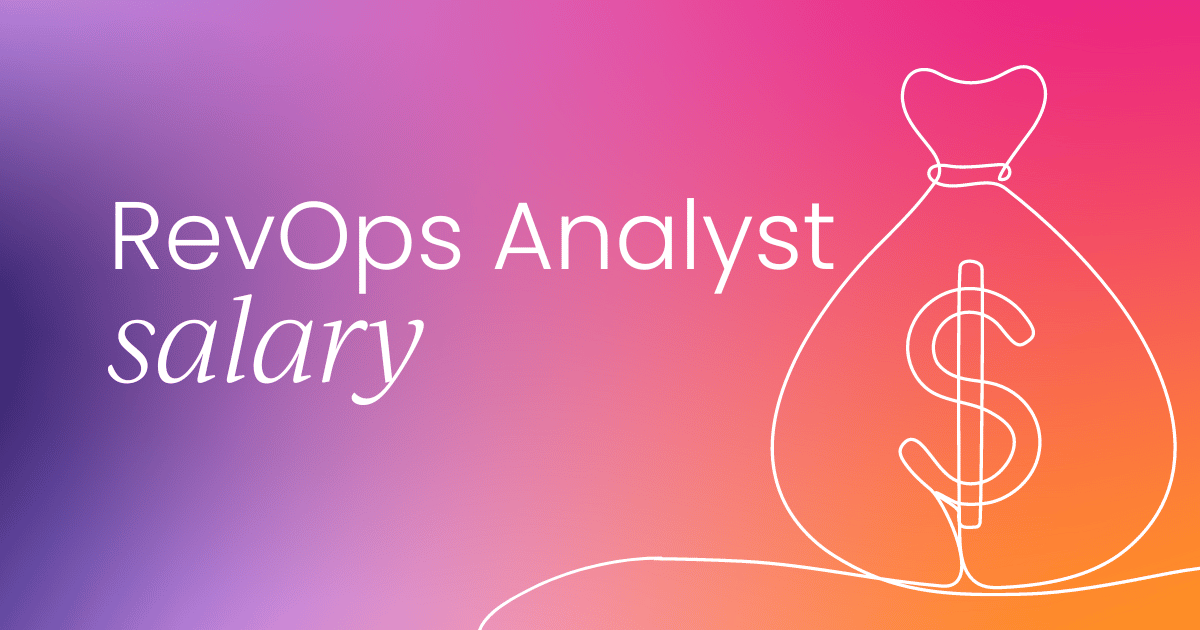Revenue operations is a quickly growing business function which aims to increase revenue growth through improved operational efficiency.
But what exactly does a revenue operations analyst do? And how much are they paid?
Keep reading to find out.
What’s a revenue operations analyst?
A revenue operations analyst is an entry-level position in RevOps, which should set the foundations of your career in this emerging field.
The revenue operations team works to support sales, marketing, and customer success teams by streamlining processes, analyzing data, and managing the tech stack. As an analyst, you’ll support senior RevOps team members in day-to-day tasks like data cleansing, and task automation.
Depending on the company, this role might be a generalist position, where you’ll learn about all aspects of revenue operations, or a specialist role where you’ll develop your knowledge in one or two areas of RevOps.
Some areas of specialization include:
- CRM management
- Data analytics
- Tool management and tech stack building
- Process automation and improvement
- Revenue enablement
- Deal desk
While this is an entry-level role, many analysts have a few years of experience in sales, sales operations, or marketing operations before moving into RevOps. This experience is valuable to understanding some of the scope of revenue operations.
Roles and responsibilities of a RevOps analyst
Some responsibilities of a Revenue Operations Analyst include:
- Analyzing revenue data to identify trends and areas for improvement.
- Building dashboards and reports to provide insights to sales and marketing teams.
- Working with cross-functional teams (sales, marketing, customer success, product, etc.) to improve operational efficiency.
- Aiding the implementation of data-driven strategies to increase revenue.
- Cleaning and maintaining the CRM database.
- Providing recommendations for pricing strategies and revenue optimization.
- Conducting sales forecasts and pipeline reports.
- Identifying and short-listing new technologies to optimize processes.
- Tracking KPIs to measure the success of revenue operations initiatives.

What’s a RevOps analyst’s salary?
According to our Revenue Operations Salary Report 2024, the worldwide average salary for a Revenue Operations Analyst is $48,367 pre-tax.
In North America, the average analyst’s salary is $65,000, while in Europe the average is $39,232 annually.
These figures don’t account for any bonuses, commission, stock options, or additional benefits, but many analysts will also receive health insurance and other bonuses.
An analyst’s career prospects
RevOps analysts can be promoted to Specialists, with a few years of experience. As a specialist, you’ll take on tasks without support and may lead some initiatives.
Our research suggests the average RevOps Specialist earns $87,590 annually. This is quite a jump from analyst to specialist!
With this in mind, analysts should seek additional responsibilities and gain experience and expertise in many areas to quickly progress. Even increasing your knowledge of the RevOps field is a huge help in boosting your early career.
Discover the full RevOps career path. 👇

4 must-have skills for a revenue operations analyst
Not sure what skills you need to get started in RevOps? Here are a few skills that’ll help you excel in your role as an analyst.
Data analysis
The ability to work with data is essential to working in revenue operations. Analytical skills and knowledge of data handling will go a long way in ensuring you can produce excellent dashboards and accurately forecast revenue.
Data analysis is also used to find inefficiencies in the sales cycle, which can be improved by the revenue operations team. Without strong data skills, it will be difficult to spot these trends and take proactive action.
It’s also important to have a basic understanding of data hygiene best practices to ensure you can effectively manage the CRM.
Problem-solving
Being able to solve problems creatively and justify why you chose a certain solution is a key skill in RevOps. You’ll face a lot of problems in your role, whether it’s a slow approval process, low tool adoption rates, or high churn rates, and it’s your job to solve the problem in the most effective way.
Often you’ll need to back up these decisions with data to senior leadership, or you may be given awkward conditions to work around, that’s why creative problem solving (and the ability to back up your decisions) is key for RevOps roles.

Attention to detail
While strategic RevOps initiatives may zoom out and look at the larger picture, many day-to-day tasks require a high attention to detail.
For example, inputting the correct data into your CRM, creating automations, and calculating the sales forecast can all go wrong with one misclick. Paying attention to the details can help to prevent these costly mistakes.
Some problems will also require specific and precise solutions, so it takes zooming in on the root cause of these problems and paying close attention to the details to effectively solve these issues.
Proficiency in CRM software
While not essential, having some experience using a CRM software like Salesforce, or HubSpot is valuable when moving into RevOps, as a lot of your role will involve using this platform.
Whether it’s data cleansing, measuring KPIs, data analytics, or sales forecasting all of these tasks will involve being knees deep in the CRM system.
But don’t worry if you don’t have experience, or have only used a different tool from the one at your organization, as you can quickly learn how to use this software.

How to upskill as a RevOps analyst
Looking to take your skills to the next level, and bag your next promotion? This section outlines some ways you can upskill yourself as a RevOps analyst, whether you have a budget or not.
Ask for feedback
The easiest way to upskill as an analyst is to ask your manager for feedback on how you can improve, then do that!
This is the best way to improve where you need it most as your manager will understand which skills or knowledge you lack, and be able to guide you towards improvement.
Make sure to create a simple plan on how you can improve the areas your manager mentioned, and follow through, you can even use additional resources to speed up your learning.
Networking
Another way to improve your knowledge is to talk with others in your field. This includes your peers but also those working in more senior roles. You can ask questions, share information, and receive advice from those with more experience than yourself.
Webinars and conferences
Listening to keynote speakers talk about their experiences in revenue operations is a huge learning opportunity. Attending industry conferences such as our Revenue Operations Summits allows you to hear how experts think about certain topics and how they approach challenges.
Don’t have the budget to attend in-person conferences? No worries, there are plenty of free webinars you can attend to get the same opportunity without the cost (or travel).
Read books, reports, and blogs
There are plenty of books, reports, and blogs out there to read up on any revenue operations topic you want to learn more about.
Sometimes reading a few articles on a subject is all you need to vastly expand your knowledge. Whether it’s metrics, CRM management, data hygiene, tech stack management, or something else, there’s plenty online to help you achieve your goals.
Courses
Another way to take your skills and knowledge up a notch, is to complete a RevOps certification. These courses help to upskill you quickly, and immediately apply your new knowledge in your role.
Our Revenue Operations Certified: Core certification is tailored to RevOps professionals in their early-mid career looking to increase their knowledge and practical abilities through a series of self-paced learning.
You’ll learn:
- What revenue operations truly means
- How to build an impactful RevOps team
- The keys to tracking your team’s success
- How to enhance the function in your organization


 6 min read
6 min read
 Follow us on LinkedIn
Follow us on LinkedIn




